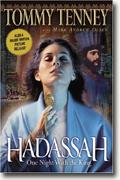
Tommy Tenney would do well to stick to preaching. If he must write, nonfiction would perhaps be better suited to his...erm..."talents". His brief flirt with fiction was a disaster, despite having been a financial success. His book was even made into a film, which, although poor itself, was miles ahead of its shoddy forerunner. The only reason for either the book or the film's success is because the story is exceptional. A beautiful tale. Wait a minute! If the story Tenney created is so great, how could be book possibly be bad??? Well, I'll tell you: he didn't make it up. He stole it from the Bible. The story of Esther, the Hebrew queen of Persia. Truly one of the most beautiful and inspiring tales of faith and sacrifice. It really is a shame that Hadassah degraded and debased this well-loved tale.
This is not unusual. Stories are often compelling, but the talent of the writer is more important. And Tenney has no talent, and, apparently, no education. The first lesson in fiction writing is that point of view cannot be tampered with. First, second, third, omniscient. That's all. A CHARACTER CANNOT BE BOTH FIRST PERSON AND OMNISCIENT. It doesn't work, it's confusing, and it's stupid. Not only is it improper, the tale would have been much more powerful if Tenney had scrapped the first person voice all together. But he was setting up a second novel, one which depended upon the first-person experience. Or so he thought. The second novel The Hadassah Covenant does not depend on this error! Had Tenney been the least bit intelligent, he would have seen through his own stupid idea.
Although the writing is terrible, it is not the only thing wrong with the book. Tenney decides to add his own story lines, no doubt in an attempt (a failed attempt, I might add) to make it more interesting. His story goes that Esther wrote her own book of memoirs about what really happened and gave it to the next queen of Persia. Esther does this because she thinks she notices the new girl praying like a Jew, and she wants to let her know all about what has happened in Esther's life so far (doesn't make much sense-I know.) So she writes the chick a 352 page letter and...wait, 352 pages??? In ancient Hebrew? I don't think so. But, the impossibility of the logistics aside, Esther finishes her "letter" and gives it to the new girl. Can't you just imagine that conversation?
"Here. I wrote down the story of my life for you."
"Umm...you're a creep."
"No, I just thought you could learn valuable lessons from my grand story. Its a little arrogant, I admit. Oh, and I wanted to straighten a few things out. Make myself look like a saint."
"Well, I'm sorry, but I don't know how to read."
"LEARN!"
"Um. Ok, I guess I could..."
"Great! Here!" (cue servant to wheel in several hundred pages of Hebraic text).
Sorry Tenney, but I don't think so. (In the story, the pages are bound into a book, but I'm choosing to ignore that considering that book binding took a thousand years after this event to develop).
So the parts of the story that Tenney adds are not too swell. What about the writing? Well, besides the problem with narration (which is a HUGE problem--half the first-person "letter" that Esther writes happens in the omniscient voice), there are also problems with religious, historical, and gender errors. Tenney is not a woman; he should never assume the first person voice of one and attempt to describe what the first menstrual cycle feels like. Especially when it has absolutely no bearing on the story!
This book was helpful in one way: it encouraged me to read the story of Esther in the Bible and get my facts straight again. And I suppose it was entertaining to tear apart. However, the sorrow that I feel at what Tenney did to such a beautiful story will never fade.

No comments:
Post a Comment